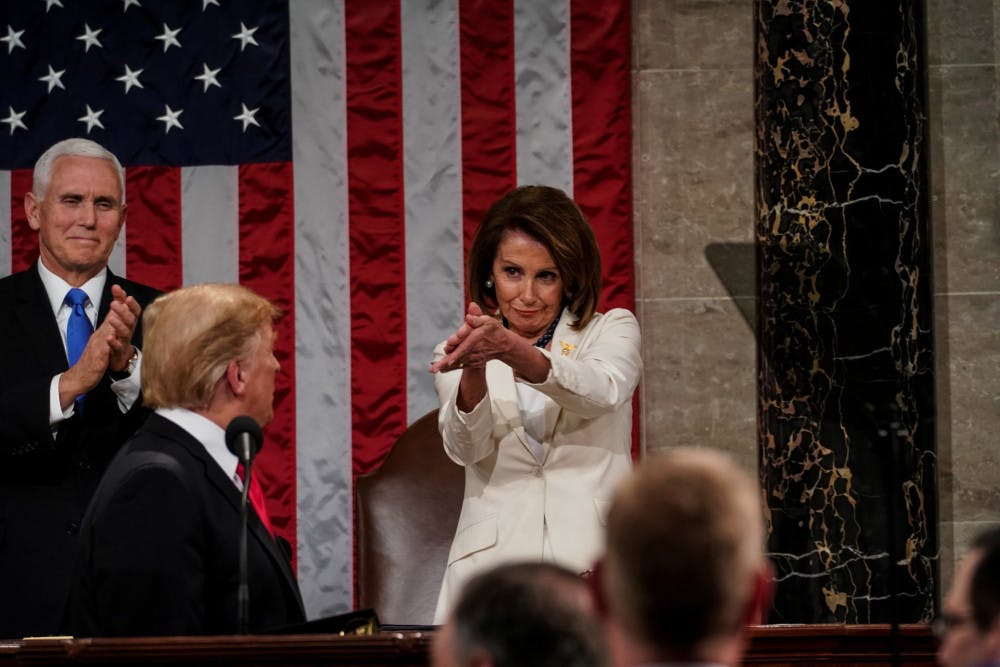On Sept. 24, Speaker Nancy Pelosi announced a formal impeachment inquiry into President Donald Trump for betrayal of the nation’s security and his oath of office by withholding military aid from Ukraine to encourage their leader to investigate political rivals for his own political gain. This marks the fourth impeachment inquiry in U.S. history, which received a variety of responses from Seton Hall faculty and students.
[caption id="attachment_28861" align="aligncenter" width="838"] Photo via Twitter/@politidope[/caption]
Dr. W. King Mott, Chair of the Political Science and Public Affairs Department, said that social media and technology is making these proceedings different than before.
Mott added, “former disadvantaged groups are engaging as equal participants,” which means that those who are have experienced privilege are “meeting outsiders dissatisfied with the status quo.”
An impeachment investigation is conducted by the U.S. House of Representatives’ Judiciary Committee. Once completed, the House Representatives will vote on the impeachment, however this decision is not to remove the President from office. Only if impeachment is passed, is the Senate required to hold a trial which could remove a sitting President from office, if found guilty. A sitting president has never been removed from office.
According to Annika Springsteel, a junior majoring in diplomacy and international relations and minoring in political science and russian, said that students “were mostly for it, some just thought that it wasn’t needed and that we should have just waited for the election.” Spingsteel said there has been discussion in her public administration class where students were encouraged to discuss the impeachment inquiry.
Springsteel, who believes the President’s verdict should have been left to the election, considers these proceedings historic overall, and for her generation.
“This is something that none of us have experienced before,” Springsteel said.
Springsteel commented on how these proceedings will impact her generation. “I think this impeachment inquiry will only get more young people involved in politics and government, no matter which side of the spectrum they find themselves on.”
Axel Sontgerath, a junior majoring in diplomacy and international relations, stated that the American people are in a state of “Trump Fatigue.” He noted that if this were any other president, the proceedings would have been wrapped up quickly, given that the American people and prosecutors have “caught [Trump] red-handed.”
Sontgerath responded to the idea that the proceedings are simply a movement concocted by the Democrats to impeach President Trump. The third-year diplomacy student emphasized that “Pelosi has been in the game for a long time. They know when they have enough information. Yeah, it could be politically motivated, but it is following acts that are fairly egregious.”
Dr. Mott noted that, “each party seeks power and the expense of the other party.” The response to impeachment is “not unique” as bipartisanship is “only really useful when politically convenient.”
The most recent testimony, and reportedly the most crucial to impeachment proceedings, was that of former U.S. Ambassador to Ukraine and U.S. diplomat Bill Taylor, whose comments shook the impeachment inquiry. Taylor confirmed in his testimony that the President did use hundreds of millions of dollars in military aid as leverage so that Ukrainian President Zelenskyy would investigate Joe Biden’s son, Hunter and the Ukrainian company he worked for, Burisma. This marks an explicit quid pro quo.
Two weeks ago, impeaching President Trump was favored by a near-majority of Americans, according to FiveThirtyEight, a website that focuses on politics, polls and economics. Since, impeachment favorability has not decreased According to the website, 48.1% of Americans support impeachment and possible removal, while 53.1% support an inquiry.
Springsteel emphasized that no matter the outcome of the inquiry, it is important because young people recognize that their voice resonates with their lawmaker’s decisions. If it does not, “there is always a vote in 2020.”
The House of Representatives announced they will hold their first vote on the impeachment inquiry on Thursday, moving into the proceeding’s public phase.
Judy Koren can be reached at judith@koren@student.shu.edu.
Photo via Twitter/@politidope[/caption]
Dr. W. King Mott, Chair of the Political Science and Public Affairs Department, said that social media and technology is making these proceedings different than before.
Mott added, “former disadvantaged groups are engaging as equal participants,” which means that those who are have experienced privilege are “meeting outsiders dissatisfied with the status quo.”
An impeachment investigation is conducted by the U.S. House of Representatives’ Judiciary Committee. Once completed, the House Representatives will vote on the impeachment, however this decision is not to remove the President from office. Only if impeachment is passed, is the Senate required to hold a trial which could remove a sitting President from office, if found guilty. A sitting president has never been removed from office.
According to Annika Springsteel, a junior majoring in diplomacy and international relations and minoring in political science and russian, said that students “were mostly for it, some just thought that it wasn’t needed and that we should have just waited for the election.” Spingsteel said there has been discussion in her public administration class where students were encouraged to discuss the impeachment inquiry.
Springsteel, who believes the President’s verdict should have been left to the election, considers these proceedings historic overall, and for her generation.
“This is something that none of us have experienced before,” Springsteel said.
Springsteel commented on how these proceedings will impact her generation. “I think this impeachment inquiry will only get more young people involved in politics and government, no matter which side of the spectrum they find themselves on.”
Axel Sontgerath, a junior majoring in diplomacy and international relations, stated that the American people are in a state of “Trump Fatigue.” He noted that if this were any other president, the proceedings would have been wrapped up quickly, given that the American people and prosecutors have “caught [Trump] red-handed.”
Sontgerath responded to the idea that the proceedings are simply a movement concocted by the Democrats to impeach President Trump. The third-year diplomacy student emphasized that “Pelosi has been in the game for a long time. They know when they have enough information. Yeah, it could be politically motivated, but it is following acts that are fairly egregious.”
Dr. Mott noted that, “each party seeks power and the expense of the other party.” The response to impeachment is “not unique” as bipartisanship is “only really useful when politically convenient.”
The most recent testimony, and reportedly the most crucial to impeachment proceedings, was that of former U.S. Ambassador to Ukraine and U.S. diplomat Bill Taylor, whose comments shook the impeachment inquiry. Taylor confirmed in his testimony that the President did use hundreds of millions of dollars in military aid as leverage so that Ukrainian President Zelenskyy would investigate Joe Biden’s son, Hunter and the Ukrainian company he worked for, Burisma. This marks an explicit quid pro quo.
Two weeks ago, impeaching President Trump was favored by a near-majority of Americans, according to FiveThirtyEight, a website that focuses on politics, polls and economics. Since, impeachment favorability has not decreased According to the website, 48.1% of Americans support impeachment and possible removal, while 53.1% support an inquiry.
Springsteel emphasized that no matter the outcome of the inquiry, it is important because young people recognize that their voice resonates with their lawmaker’s decisions. If it does not, “there is always a vote in 2020.”
The House of Representatives announced they will hold their first vote on the impeachment inquiry on Thursday, moving into the proceeding’s public phase.
Judy Koren can be reached at judith@koren@student.shu.edu.





